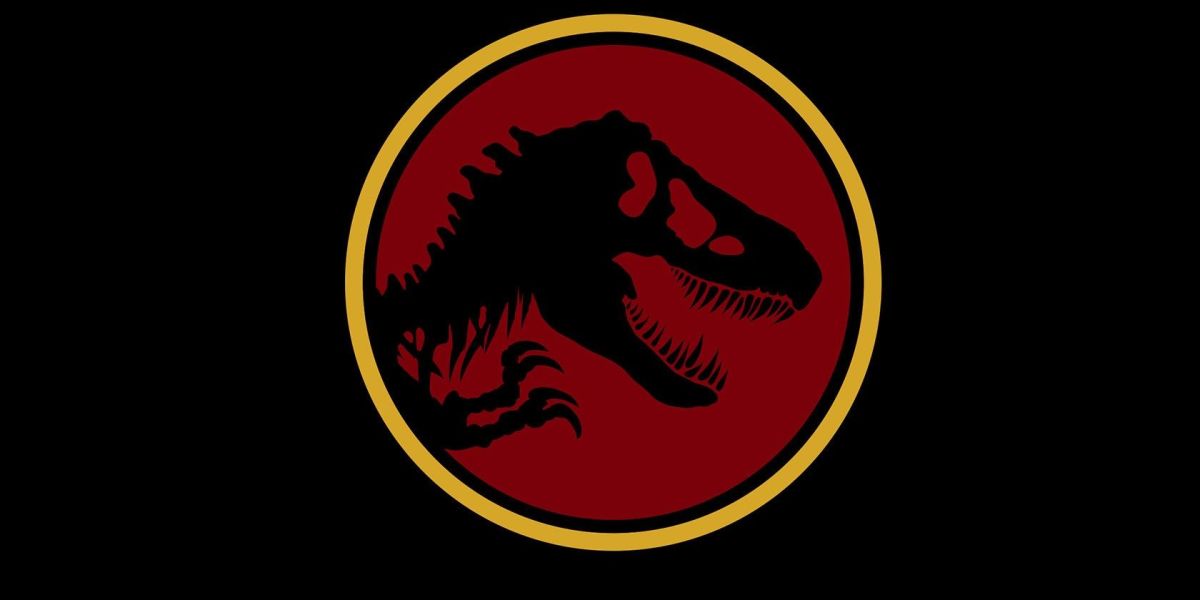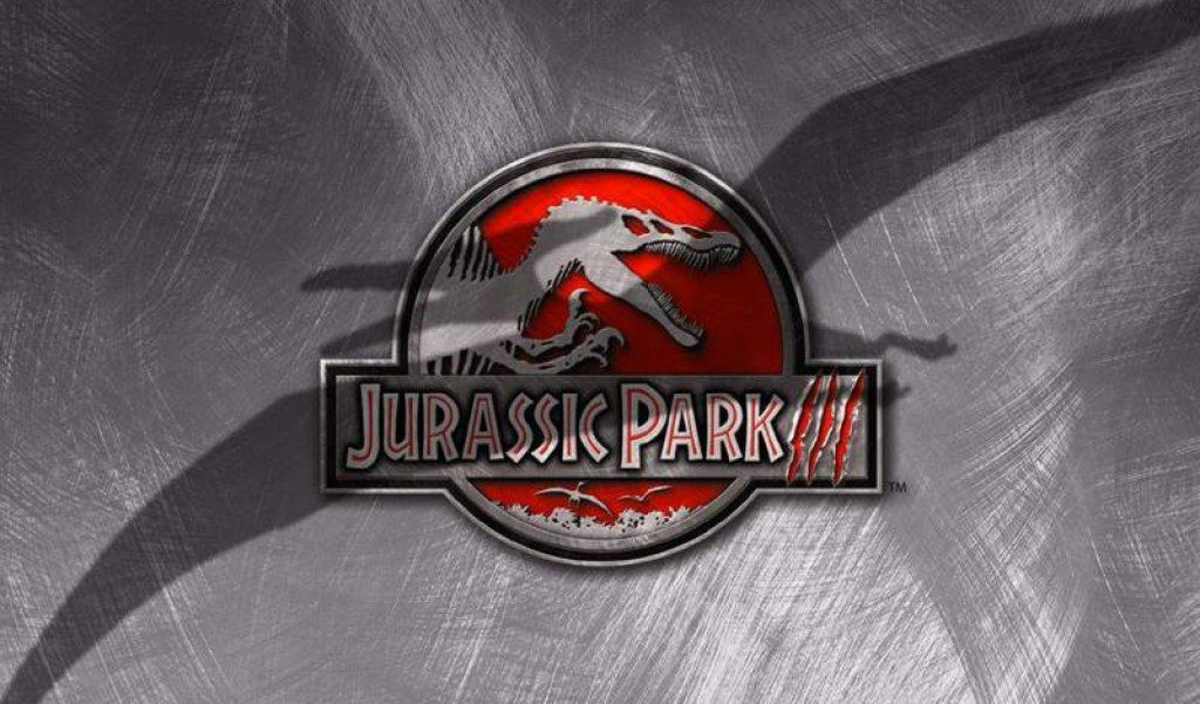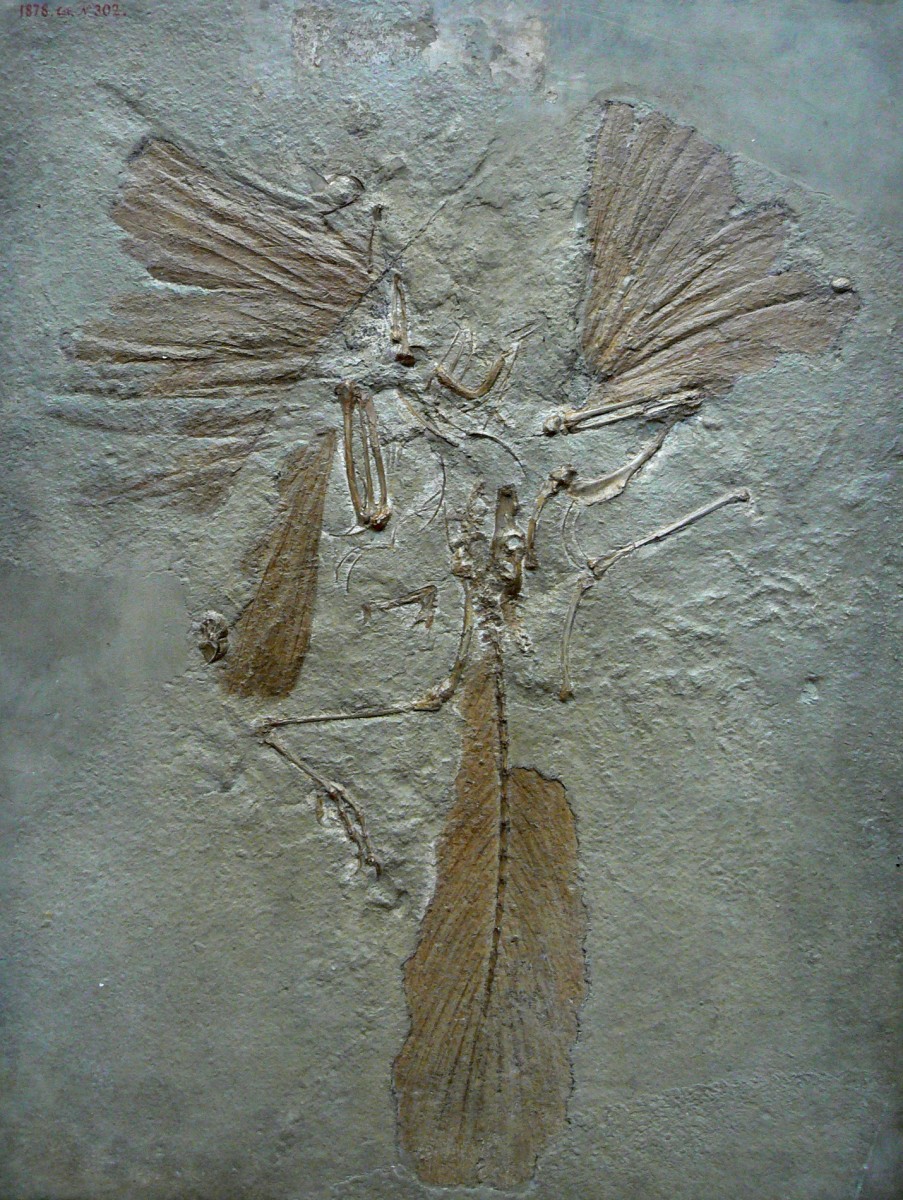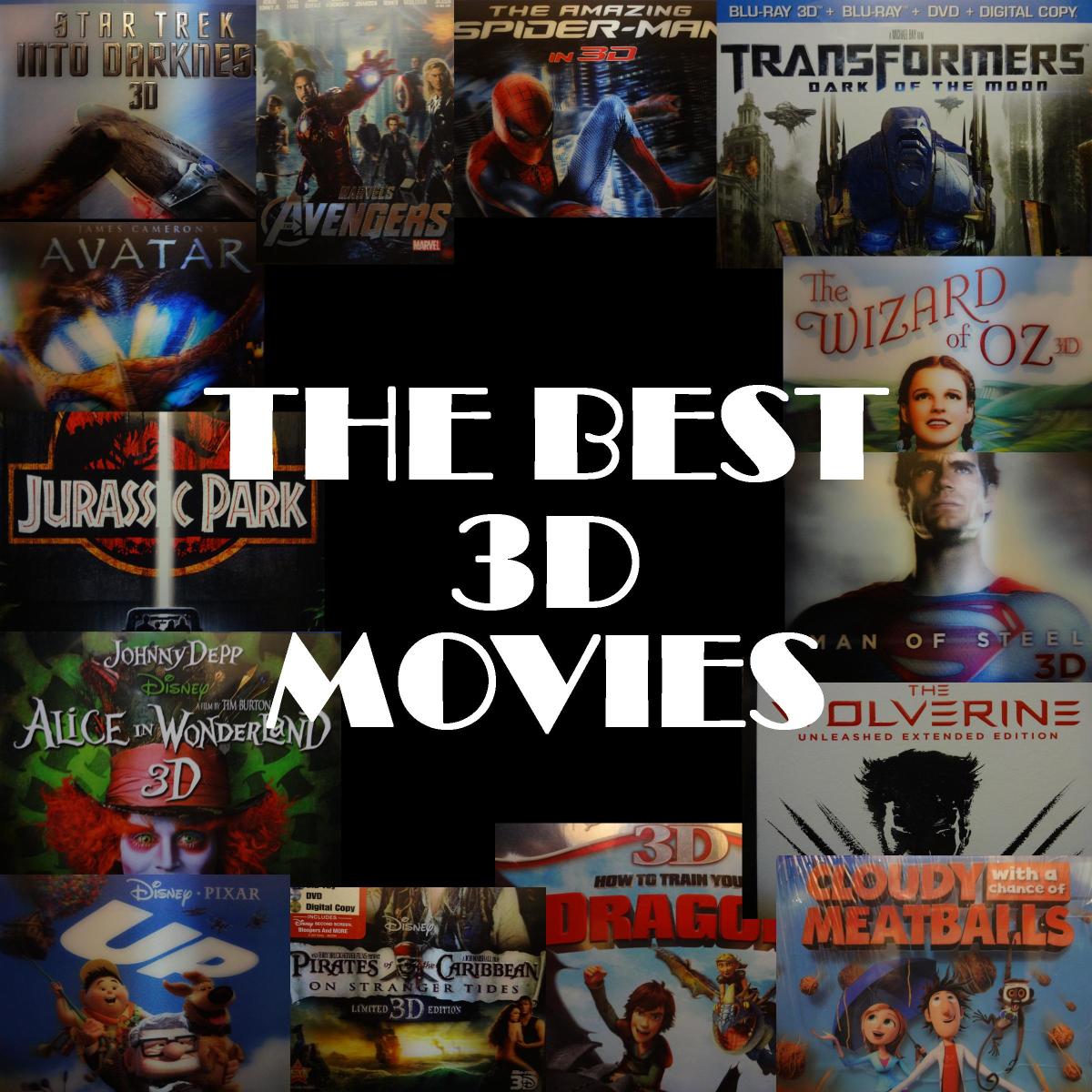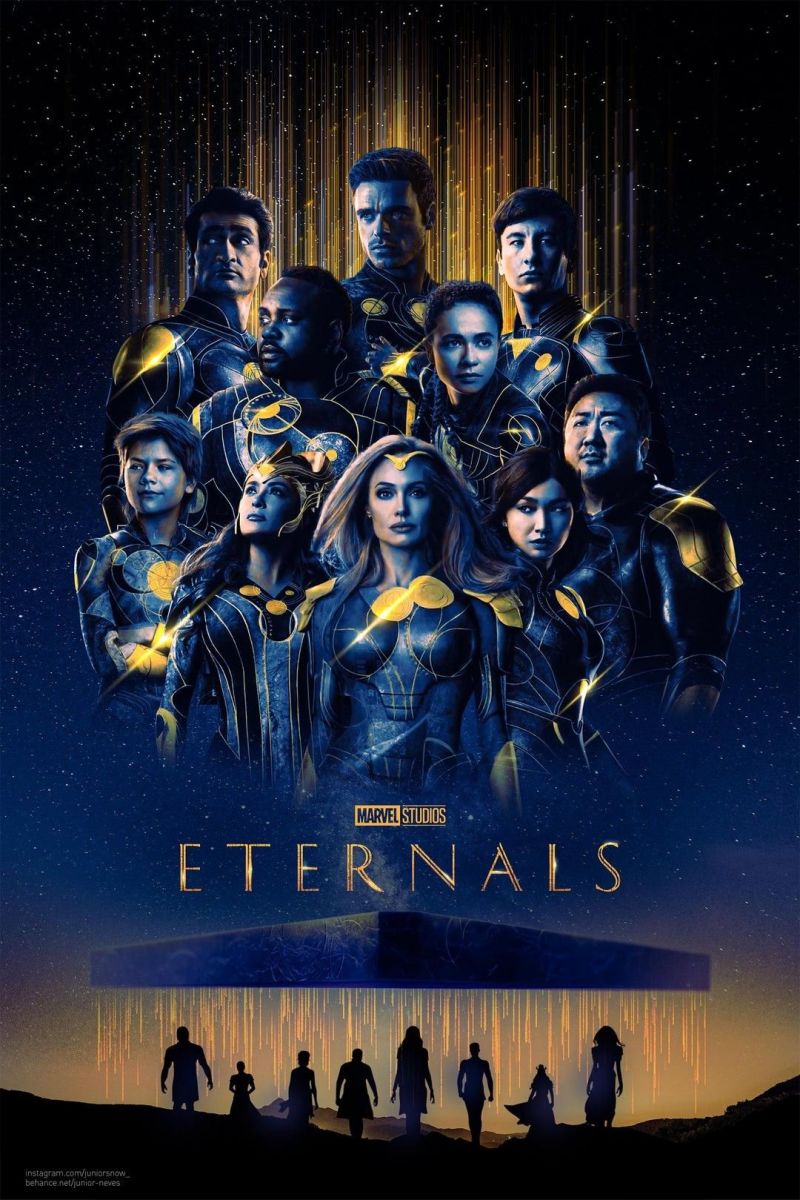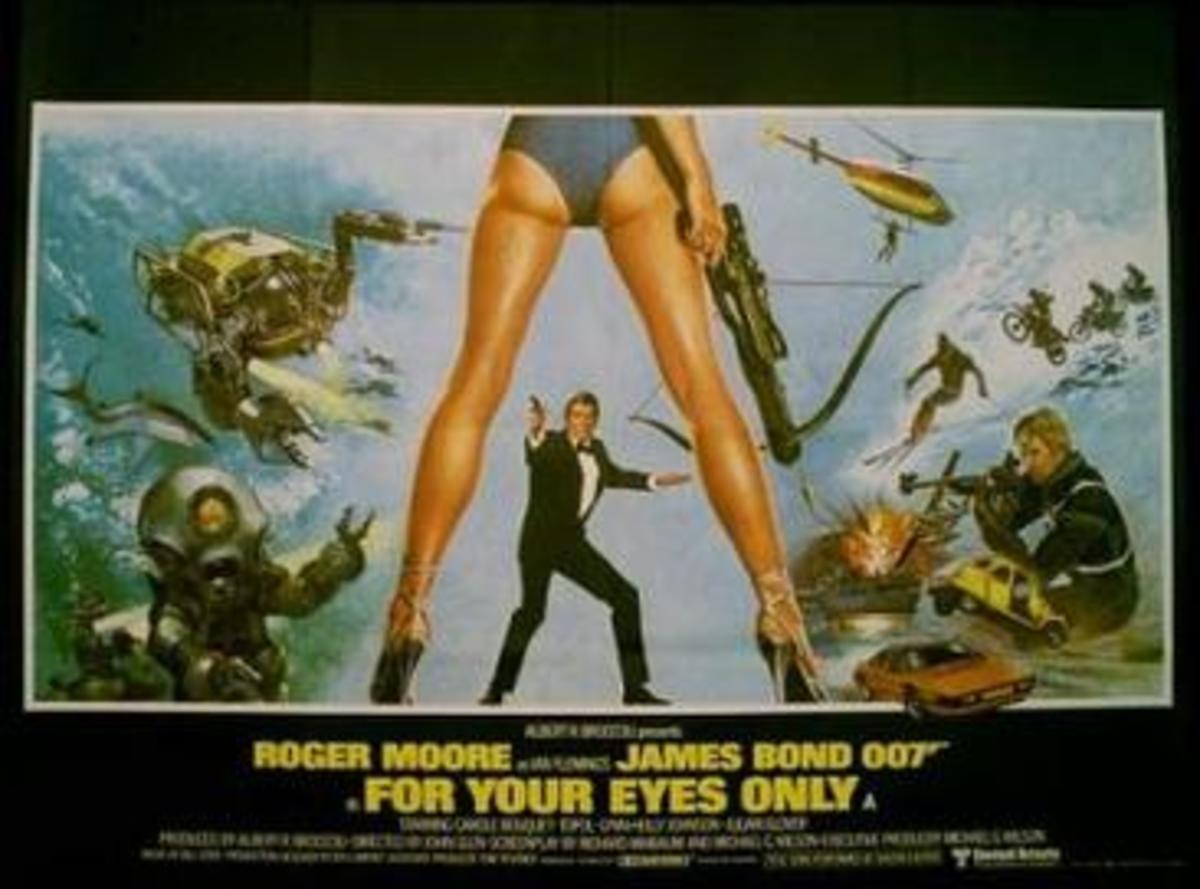The Jurassic Park Trilogy: Looking Back
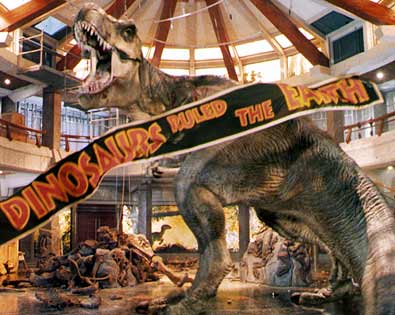
Spared No Expense
It was the summer of ‘93 and there were two movies I wanted to see: Jurassic Park and Super Mario Bros: The Movie. One of those films was an epic viewing experience; a grand scale epic that put you on the edge of your seat, astounded your senses and left you speechless once the end credits were rolling. Well, let’s just say that grand scale, epic viewing experience didn’t involve two hapless plumbers being sucked into a parallel dimension of gargantuan Goombas, a Ruffle-headed Dennis Hopper and an overrun Metropolis with a bad fungal infection. So apologies to Mario, but it was Jurassic Park, Steven Spielberg’s groundbreaking Dino-sized film. This was the definitive film watching experience for an adolescent in the 90s just like Star Wars was in the 70s and Raiders of the Lost Ark was in the 80s. With such a popular film leaving its impact in the world of cinema, a sequel---ahem, I mean sequels---were pretty much a guarantee. However, neither the more action-packed and darker Jurassic Park: The Lost World or the painfully awful Jurassic Park III were to capture the same magic and awe that the first addition provided. They tried, but in the end it was still the first Jurassic Park that we held in the highest regard when it comes to childhood nostalgia.
With the fourth addition Jurassic World being released in the theaters this weekend, my interest in the original trilogy has once again been reignited. Over the past week, I’ve re-watched all three Jurassic Park films to gain a fresher insight into the films that popped up over the years of my adolescence. It’s been some time I must say and for the most part the opinion I had towards the three films in the past still holds true in that the first is still an awesome viewing spectacle while the two subsequent films, although ambitious, failed to live up to expectations. Obviously older in my years now than I was when first watching these movies, there is a little ripened cynicism towards these films especially in regards to the first which I found to be the perfect film as a 9 year old sitting giddily in his reclining movie theater chair munching on stale popcorn and excitedly watching the Tyrannosaurus Rex viciously chase a jeep with a bunch of actors I didn’t know the names of at the time. Yet, despite the imperfections associated with the three films which comprise the Jurassic Park trilogy, a precursor of excitement and stimulating entertainment always came with them and the same holds true with Jurassic World which I will view later today. Until then, I do hope you enjoy the written trek down the gravelly memory lane in Jurassic Park I have provided…Spared no expense.
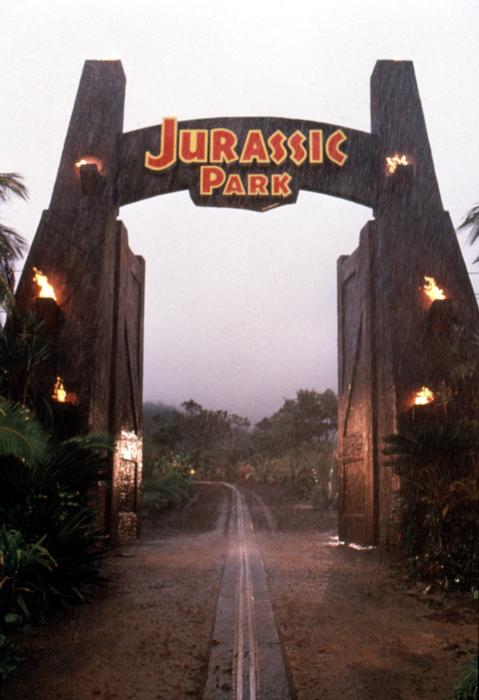
The Gates Open...Jurassic Park (1993)
Beyond the heart-pounding T. Rex chase sequence and the awe-inspiring first glance at the herds of Brachiosaurus and the out-witting of those crafty Velociraptors, the scene where the gates of Jurassic Park ominously open leading Jeff Goldblum’s smarmily cynical mathematician Dr. Ian Malcolm to utter, “What do you think they got in there? King Kong?” is the key scene to Jurassic Park. This is Steven Spielberg’s welcoming to a movie adventure that would bring its eagerly awaiting audience into a world where dinosaurs once more walked the Earth. Only this time we’re throwing in a mix of human beings conjuring up the ethical notion of how an extinct ecosystem of over 65 billion years will react in a modern day environment.
This dilemma of man versus dinosaur is played very well throughout Jurassic Park. There is a childlike innocence about the character of InGen CEO John Hammond portrayed by the late Richard Attenborough. He’s charming, instantly likeable and only holds the best intentions by sharing what he has created with the world...and he’s shared no expense. Unfortunately, he doesn’t understand the immense power of unpredictability associated with incorporating an extinct ecosystem into present-day settings under the banner of a family theme park. After an unfortunate accident involving the death of an InGen employee involving a Velociraptor shown during the opening titles of Jurassic Park, Hammond is seeking the endorsements of his new theme park from renowned paleontologists, Dr. Alan Grant (Sam Neill) and Dr. Ellie Sattler. More, he must appease the conflicting opinions of his investors’ lawyer, Donald Gennaro (Martin Ferrero), who is originally concerned in the area related to the general safety of his theme park after the aforementioned raptor fatality incident and the skepticism towards its success and functionality as a theme park presented by Dr. Ian Malcolm (Jeff Goldblum). Although the group Hammond brings to the Costa Rican island of Isla Nublar is initially awestruck by the grand sight of a herd of Brachiosaurus grazing across the landscape, doubts towards the ethical implications such a park could pose are brought to the surface by those whose endorsement Hammond is readily seeking---with the exception of obviously doomed, “blood-sucking” lawyer Donald Gennaro who sees dollar signs rather than dinosaurs upon first laying his eyes upon the brachiosaurus herd.
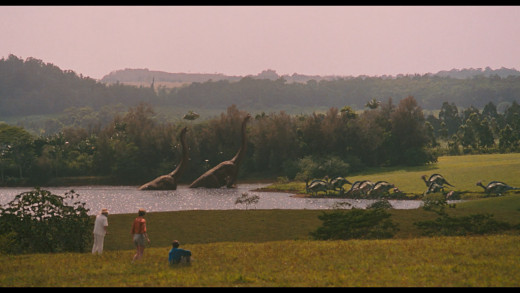
Dr. Ian Malcolm is the first to forefront the problems associated with Hammond’s desire to publicly open Jurassic Park through questioning the park’s safety guideline of genetically breeding dinosaurs exclusively as females. He offers the fact that life cannot be barricaded and that it breaks free sometimes “violently” and “dangerously”…but ultimately (and to use the film’s famous quote)…life finds a way. Grant and Sattler eventually follow suit once discovering Hammond has had his geneticists breed velociraptors, an extremely dangerous and cunning breed of dinosaur. Deciding to give the park a chance, the scientists and the “money-grubbing” lawyer embark on a tour of the park along with Hammond’s young grandchildren, the “hacker-nerd” Lex (Ariana Richards) and Tim (Joseph Mazzello) who shares a budding interest in dinosaurs. From here, we are subjected to an adventure cursed under Murphy’s Law…Everything that could go wrong…does. The first tour of Jurassic Park is a disaster due to the no showing of the park’s main attractions (its dinosaurs who seem a little shy showing themselves to a gawking public); a financially frustrated computer programmer disables the park’s security system which includes the shut-down of both the electric fences keeping the dinosaurs at bay and the electronically-run Ford Explorers cease carrying the characters through their tour of Jurassic Park; Dinosaurs break free compromising the disabled electronically controlled barricades, characters get devoured and a disappointed, yet empathetic John Hammond does not get the endorsement he was seeking.
Basing Jurassic Park off of Michael Crichton’s 1990 best seller of the same name, Steven Spielberg produced a film of legendary proportions. Going beyond the awesome spectacles the dinosaurs are, there is a smaller, if not more complex, story underneath its surface which surrounds themes such as bond between man and animal, men taking on the role of God, and the ethics and implications of negligent capitalism. The first two themes are rather obvious as Jurassic Park does clearly show the relationship which develops between man-made dinosaurs and human beings; at first, and to quote Dr. Ian Malcolm from The Lost World, there is a factor of “ohhhh” and “ahhhh”, but eventually there is “running” and “screaming”…Initially, the characters are amazed by the awe-inspiring sights of the dinosaurs, but they eventually come to the realization of the unfeasibility of merging both the human and dinosaur ecosystems into one.
Yet, upon watching Jurassic Park more recently, it is noticeable that there is an underlying sharp commentary towards the economic system of capitalism which is wholly represented by the John Hammond and Donald Gennaro characters. Hammond often remarks throughout the film of how he has “shared no expense” towards the creation of Jurassic Park, but is admonished by Dr. Ian Malcolm as wielding the power he created as a little boy who found his father’s gun. This shows us that Hammond is properly assessed by Malcolm; although Hammond has invested large amounts of cash into his park and the bioengineering of dinosaurs, his main focus is gaining back the money invested and generating a profit throughout the park without acknowledging the potential dangerous consequences of his creation. This inclination is also shared by Donald Gennaro whose primary concern was to ensure the safety of the park; but upon seeing the dinosaurs he switches gears and remarks how much money the park will bring to its investors. In essence, the park is representative of sloppy and irresponsible capitalism which backfires when nature is turned into a commodity to generate capital leading to destructive results. For more on the commentary related to capitalism in Jurassic Park, I’ve posted a video below presented by the PBS Idea Channel which further examines this opinion towards Jurassic Park.
Jurassic Park: A Commentary on the Evils of Capitalism?
As pure entertainment, Jurassic Park is simply an amazing film with a phenomenal all-star cast, amazing special effects, thrilling sequences and an inspiring, triumphant John Williams soundtrack.
Although Sam Neill’s Dr. Alan Grant and Laura Dern’s Dr. Ellie Sattler are the main protagonists in the film, the most engaging character of the bunch is Jeff Goldblum’s Dr. Ian Malcolm who is the proverbial thorn in the side of Richard Hammond. The competitive banter between Jeff Goldblum and Richard Attenborough is reminiscent of the relationship between Spencer Tracy and Fredric March in Inherit the Wind and more scenes between the two could have further progressed the debate between impulsive capitalist urges and a respect for the nature of complex systems. But, the real stars of Jurassic Park are the CGI animated dinosaurs. Even as of today, the technical wizardry of both the CGI used and animatronics to bring dinosaurs to life onscreen are realistic enough without ever feeling anachronistic or hokey. Bringing these dinosaurs to life onscreen also provided us with some of the film’s most exhilarating sequences including a boisterous T. Rex chase sequence and intense, edgy moments when the characters are faced with guile Velociraptors who are viciously astute when attempting to attack their prey. Along with all visual components of the Jurassic Park story, composer John Williams’ soundtrack stunningly accompanies the entertaining spectacle Steven Spielberg masterfully brings to the screen.
Ultimately, Jurassic Park is a great film that entertains, but it isn’t perfect. The film does require a lot its audience to suspend their disbelief with its countless plot-holes and contrivances; Well, I suppose it is a film about bringing dinosaurs back to life of course, but still, there are moments that prove themselves to be painfully dumb. Let’s list some below:
- John Hammond’s grandchild Lex is intelligent enough to efficiently hack into the computer system of Jurassic Park, but has trouble when it comes to turning off a flashlight which obviously is an attention-getter for the T. Rex?
-
How on earth does the T. Rex enter the final facility towards the end of the film to save the day for the characters who are about to be devoured by a pack of Velociraptors? It has been mentioned that this particular facility was one that was undergoing renovations, so there may have been an open area for the T. Rex to successfully enter. But, every scene with the T. Rex up until this moment had been preceded by ominous warnings (heavy footsteps, the rippling water). Yet, out of nowhere here is the T.Rex standing in the middle of the facility full forced and ready to kick some Velociraptor ass. For all intents and purposes, I’m assuming this was a scene that was supposed to excite and “wow” the audience, but the contrivance of inserting the T. Rex in haphazard fashion was just plain dumb.
-
Two kids (Lex and Tim) are able to outsmart two cunning Velociraptors in a kitchen, but experienced game-warden, Muldoon (Bob Peck), has no such luck as he is violently devoured in the jungle…Perhaps it was because Muldoon was on the Velociraptors’ home turf where they had an advantage? Maybe the typical Velociraptor doesn’t know its’ way around a kitchen leading Lex and Tim to gain the upper hand? I don’t know…
-
Hammond is adamant about his park not catering to the “super-rich”; but seeing how it is on an island and requires I’m assuming a flight to Costa Rica and chartering a helicopter to get to the island, this may not be completely feasible for the typical blue collar family…even if there is a “Coupon Day”.
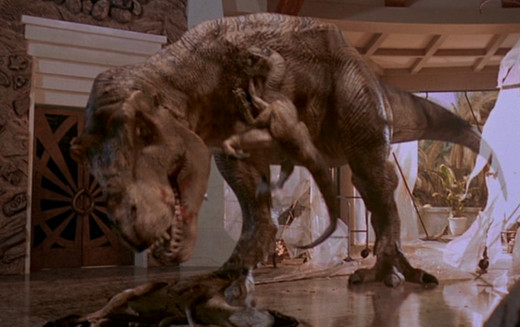
There are other plot-holes and contrivances such as these which decrease the credibility of the film. There are also moments that tend to slow the film down to an annoyingly sluggish pace which mostly falls on the sequences where an initially child-wary Dr. Alan Grant begins to develop a friendly relationship with Lex and Tim when they are stranded in the jungle. These scenes are wrought with the typical Spielberg cringe-worthy schmaltziness which reek of predictability. We see in the beginning that Grant is wary of children and can easily conclude that by the end of the film, because of common Spielberg plot conventions, that he will come to develop a liking for the kids who are appropriately put in this movie for that specific purpose.
However, even with its drawbacks, Jurassic Park is still an entertaining and enjoyable film which has left its stamp of importance in both film-making and pop-culture.
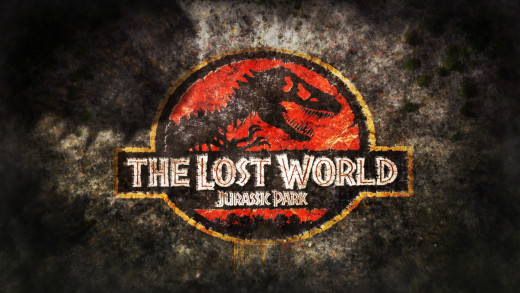
Mommy's Very Angry...Jurassic Park: The Lost World (1997)
After the immense worldwide success of Jurassic Park, audiences were hungry for more destructive dino-action. The fervor for was so great that Steven Spielberg was able to convince a reluctant Michael Crichton to pen the 1995 novel “The Lost World” of which this film is loosely based upon. Once Chricton had finished his novel, Spielberg and screenwriter David Koepp had their blueprint for the next entry into the Jurassic Park series and soon enough production was underway for the next chapter.
Released on May 23rd, 1997 to understandably mixed reviews, Jurassic Park: The Lost World opened to immense popularity holding the record for opening box office receipts up until 2001. For many, this is a film that divides its audiences as it divided the critics. This was a darker film that took itself way too seriously in comparison to the magical spectacle that the first provided. More, this was a film that was much duller than the previous installment in both story content and characters. But upon brushing the dust off this film I haven’t viewed in several years, I gave it another whirl and chance on my DVD player.
The basic premise of Jurassic Park: The Lost World concerns the nephew of John Hammond and new CEO of InGen Peter Ludlow (Arliss Howard) who is attempting to open a Jurassic Park on American soil to bring Hammond’s vision to full realization. Former capitalist turned naturalist John Hammond, now bedridden with an undisclosed illness, summons a disgraced Dr. Ian Malcolm to his mansion where he propositions him to observe and document the dinosaurs in their natural habitat on the island of Isla Sorna (aka Site B which is the area where the dinosaurs were engineered and nurtured before being transported to Isla Nublar, home of Jurassic Park). Initially reluctant, Malcolm agrees to go to the island upon discovering his animal behaviorist girlfriend, Sarah Harding (Julianne Moore), is already there by herself documenting the dinosaurs. Accompanied by idealistic video documentarian Nick Van Owen (Vince Vaughn) and equipment specialist Eddie Carr (Richard Schiff), Malcolm arrives on the island to discover that InGen has sent a group of mercenaries and paleontologists to capture the dinosaurs roaming upon Site B in order to open a Jurassic Park in San Diego.
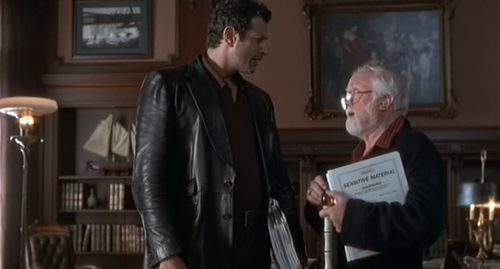
Jurassic Park: The Lost World can be summed up as a loose re-telling of King Kong, where we are brought along through an adventure which takes place in a menacing jungle filled with dangerous creatures only to have the king of those dangerous creatures (the T. Rex) captured and brought back stateside as a main attraction. As a sci-fi action/thriller, Jurassic Park: The Lost World exceeds in stunning fashion. The film is laced with non-stop action and thrills rarely letting up to allow the audience to become bored. The dinosaurs inhabiting Site B are featured much more prominently than they were the first installment, but somehow the magic and awe we experienced with the first Jurassic Park isn’t to be felt with The Lost World. But the plot developments which lead up to these action-packed thrills are excruciatingly dumb, mildly irritating and nonsensical.
A subplot in the film is for big game hunter, Roland Tembo (portrayed with vast bravado by the late & great Pete Postlethwaite), to capture his main prize, the Tyrannosaurus Rex. To do so, he kidnaps a baby T. Rex and uses its cries to help draw big mama into his trap. However, the “heroes” of the film (namely Sarah Harding and Nick Van Owen) release the captured dinosaurs of Ludlow’s employed mercenaries and hunters (which results in mass destruction of their campsite) and foolishly bring back the baby T. Rex back to their camper to mend its broken leg much to the understandable worry of Malcolm. Understandably, “Mommy’s very angry” once discovering her baby in the hands of a human group who only held the “best intentions”. A plethora of reckless decisions such as this are made in this film which often result in catastrophic consequences leaving the frustrated audience to ask their television set, “Why the hell would you do that!?” But, such dumb decisions serve as the substance for the fun thrills shown throughout the film. Therefore, you’re able to forgive the dumb errors of the characters to be entertained by the resulting heart-pounding pro-longed sequences of action. And the action in this film is a lot of fun.
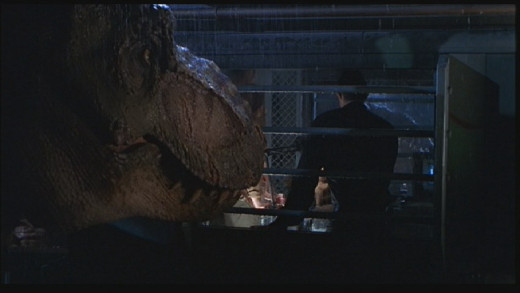
Yet, as a movie, Jurassic Park: The Lost World pales in comparison to its predecessor. There are areas of implausibility that really do not mesh well when translated into a filmic medium. Obviously there were areas written on paper that probably sounded good, but rendered themselves terribly on film. An instance of this is where we are treated to an unintentionally and comically bad scene where Dr. Ian Malcolm’s daughter Kelly (Vanessa Lee Chester) randomly engages in a gymnastics routine where she is able to forcibly kick a Velociraptor through a window to its death. Is this meant to be thrilling? Or is it meant to make us laugh at its absurdity? Of the entire film, this is the one moment where the film jumps the shark and loses some of its credibility.
Raptor is Owned by a Gymnast...Sheesh.
Plot-holes are also abundant in this film much like its predecessor. Once again, let’s take a look at a few of these annoying little tidbits which tend to undermine the quality of Jurassic Park: The Lost World.
- Dr. Ian Malcolm’s daughter hitches a ride with the others to Site B without him ever knowing only to be surprised when she randomly pops up to greet him once they’ve arrived on the island. Before embarking on this doomed adventure, wouldn’t have Dr. Ian Malcolm at least said “Goodbye” to his daughter? Is he that much of an absentee father to not do so?
-
The crew members of the ship carrying the captured T. Rex are found to be mutilated once the ship arrives in San Diego. The T. Rex was captured and bound in an enclosed compartment. I guess the T. Rex was able to open that compartment up by itself, have itself a midnight snack and peacefully return to its compartment for a nap before arriving in San Diego. Also, with the ship’s entire crew dead, how in the name of all that is holy was it able to direct itself to port in San Diego?
-
There sure are a lot of people awake and open businesses in San Diego in the “wee small hours of the morning”.
-
Sarah Harding (Julianne Moore) is adamant that humans must keep their distance from nature, but seems to have no problems herself petting a cute baby Stegosaurus igniting the angry tempers of a Stegosaurus herd or bringing back an injured baby T. Rex leading its angry parents directly to their campsite.
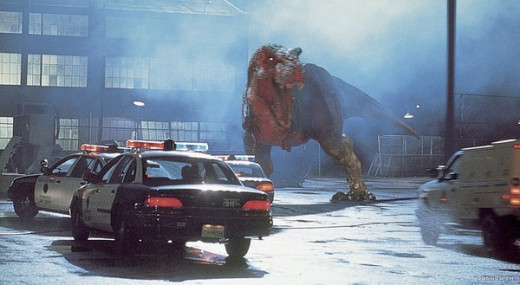
Jurassic Park: The Lost World is by no means a perfect film or Steven Spielberg’s greatest achievement. And in all honesty, I feel that I’m being a little too harsh on it. There are great moments in this film which save it from being a complete disaster. Pete Postlethwaite as big-game hunter Roland Tembo delivers an excellent no non-sense performance. This character is very much similar to another one of Spielberg’s macho outdoorsman “Quint” from Jaws. Both the Roland Tembo and Quint characters share rugged, robust commonalities that it would be easy to see the two sharing a glass of whiskey sharing “scar-stories” in some abandoned pub off the beaten path. There’s also an interesting source of trivia that the Roland character is named after the Warren Zevon song “Roland the Headless Thompson Gunner” which tells the story of an expert gunner named Roland who is murdered by an individual known as “Van Owen” (Vince Vaughn’s character’s name is Nick Van Owen and shares a contentious relationship with Roland Tembo throughout the film).
The final sequence is also effectively enticing as we watch the T. Rex stampede through a busy San Diego leaving behind a path of destruction. It must be noted that screenwriter of The Lost World David Koepp is the “unlucky bastard” at the video store who is devoured by the hungry T. Rex. The rampage through San Diego is by far the most thrilling scene present in this film and is sure to exhilarate. It’s also nice to see Jeff Goldblum take the lead in this film as he was one of the highlights in the previous Jurassic Park movie. Unfortunately, as compelling as his character is, he seems to play the babysitter to a group of “in-over-their-heads” scientists who have no clue in what they are doing on an island filled with unpredictable creatures choosing to ignore the practical advice and warnings of the Dr. Ian Malcolm character.
In all, Jurassic Park: The Lost World is a fun, thrill-seeking adventure film where it is necessary to set aside any notions you may hold towards common sense, rationality and critical thinking. Such components are not needed when watching a film like this, and if you try to over-analyze it, you’ll hate it. Approaching it as a standard sci-fi adventure is the best way to fully enjoy this film…Just fast forward through the “gymnastics scene”.
Warren Zevon's Final Performance of "Roland the Headless Thompson Gunner"
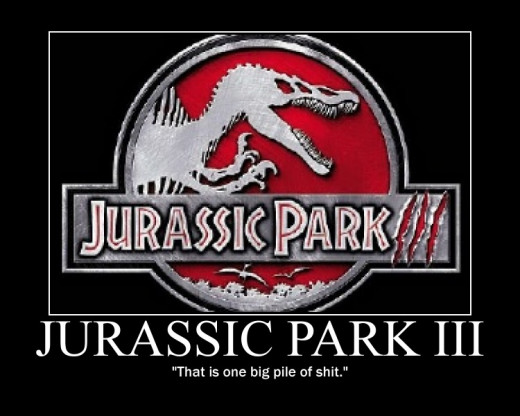
Jurassic Park III (2001): Should It Have Been Subtitled “Reverse Darwinism”?
Director Joe Johnston originally wanted to direct Jurassic Park: The Lost World, which Steven Spielberg ultimately chose to direct himself. Spielberg who is good friends with Johnston promised him if there was a third Jurassic Park, he would relinquish directing duties to his pal. Johnston is a capable film director who has put out such works such as October Sky and The Rocketeer and more recently Marvel’s Captain America: The First Avenger. But, the final product he delivered in the summer of 2001 entitled Jurassic Park III is an absolute cinematic travesty. This entry to the Jurassic Park movie series is completely unnecessary and must be forgotten as an unfortunate speed-bump in the franchise. Whereas Jurassic Park: The Lost World was just plain old dumb, but fun, Jurassic Park III is just plain, old dumb and excruciatingly annoying.
The plot of this film is paper-thin. Dr. Grant reluctantly agrees to accompany supposedly wealthy couple Paul and Amanda Kirby (William H. Macy and Tea Leoni) to the island of Ilsa Sorna (Site B) as a weekend excursion where they can see the herds of dinosaurs roaming the landscape from above in the safety of chartered jet. But, it’s soon discovered that this eccentric couple has ulterior motives…The real reason they want to travel to the island known as Site B is for a search and rescue mission for their son Eric who was last known to be parasailing over the vicinity. Armed with mercenaries who quickly become appetizers for the dinosaurs roaming on the island, The Kirbys must rely on the expertise of Dr. Alan Grant and his research assistant Billy Brennan to escape the dangerous island once the chartered jet has appropriately crashed. Will they find Eric? Will they get off the island? Who cares…
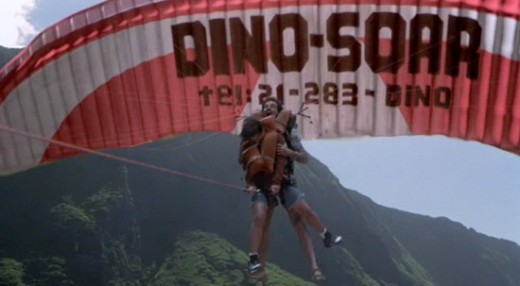
The main problem with Jurassic Park III is that it is a rushed effort. We’re briefly introduced once again to Dr. Alan Grant who accepts a financial offer to further fund his research by the Kirbys and then we’re on the plane back to Site B. The “mercenaries” hired by the Kirby family have a few lines of dialogue before being violently devoured a Spinosaurus which also subsequently snaps the neck of the T. Rex in an unfulfilling fight sequence which is over before it even begins. The characters now lost in the jungles of Site B then search for an escape route all the while being unexcitedly pursued by the aforementioned Spinosaurus, Velociraptors and Pterodons. It’s plainly obvious this film was quickly thrown together, edited and distributed to theaters under the Jurassic Park name to capitalize on its success. It’s truly a wonder that Steven Spielberg allowed his name to be credited to this lackadaisical mess.
Sam Neill returns comfortably to his role as Dr. Alan Grant, but much like Jeff Goldblum’s Ian Malcolm in The Lost World, he’s relegated the role of a babysitter ensuring that the unadulterated idiocy represented in full by both John and Amanda Kirby does not endanger their lives. In fact, you’re hoping that Grant ditches these two who are more concerned with bickering with one another leaving them as a fresh snack for the carnivorous dinosaurs roaming the island. John and Amanda Kirby are not likeable, nor do you feel empathy towards them in the search for their son. Early on in the film Dr. Alan Grant makes a humorous quip towards Billy about Reverse Darwinism being the survival of the idiotic. Ironically, it’s the dumbest characters in this film (The Kirbys) who survive. In fact, this film should have come with the subtitle “Reverse Darwinsim” because it is by far the dullest, dimmest and dumbest movie of the franchise.
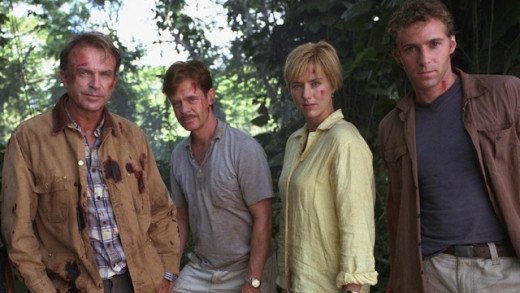
Plot holes? Yep, we have those…
- John Kirby professes to Alan Grant that he is a massively wealthy CEO of a company called Kirby enterprises and that he is willing to make a sizable donation to Grant’s research if he willing to accompany he and his wife to Ilsa Sorna. Wouldn’t an intelligent guy like Grant at least research the background of John Kirby and confirm who he says he is?
-
Amanda Kirby using a megaphone to call out her son’s name on an island filled with predatory creatures. Why would you blatantly do such a thing when you know that there are animals on this island who have a voracious appetite for human beings?
-
We see research assistant Billy Brennan getting mangled by a pack of Pterodons after he heroically risks his life to save Eric’s…But, no worries…he’s just fine at the end if not a little banged up. How was he able to escape this his dire situation?
-
The Spinosaurus manages to consume a satellite phone which belonged to one of the mercenaries we’re not supposed to care about. Yet, the phone is perfectly intact even after being devoured and can still receive a signal when being processed through the dinosaurs’ digestive system. It’s also found relatively quickly within the large pile of dino-dung…Honestly, how does this phone even still work?
-
The US Embassy will obviously not do anything about rescuing your son from an accident which takes place over an internationally banned island…But, the Army and Navy make it first priority once it is found out that none other than Dr. Alan Grant has had the bad luck of being marooned there.
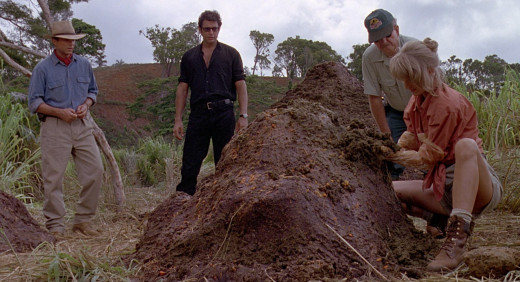
There is a scene in the first Jurassic Park where Dr. Ellie Sattler is digging through a large pile of Triceratops dung searching for clues to determine why a Triceratops was feeling under the weather. That’s what Jurassic Park III is; a big pile of dino-dung where you as the viewer are fruitlessly searching for any integrity that may be within it. The special effects are new and improved and the return of Dr. Alan Grant is a welcoming addition, but ultimately, Jurassic Park III is a horribly bad film even for B-Movie badness. So bad to the point that it has taken 14 years of screenplay rewrites to avoid this type of disaster from being produced again.
Conclusion
Hours from now, I will be viewing Jurassic World which at this point has garnered a majority of favorable reviews. I plan to attend the theater with an open mind erasing from memory my recent re-watching of Jurassic Park III. Yet, the main component of the Jurassic Park films is to entertain and as long as they do exactly that, future films will be guaranteed. I’ve spared all the expense I could muster. Off to the theater.

